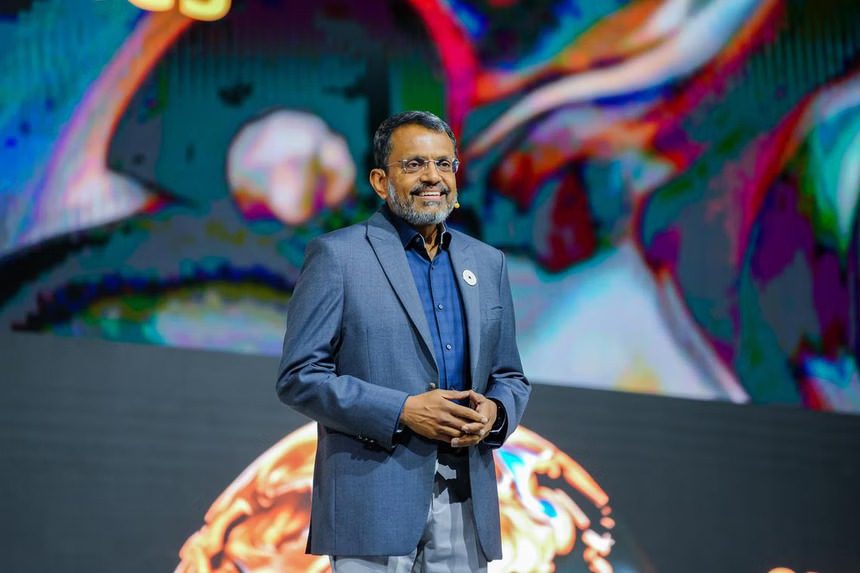Delaying progress on net zero will lead to ‘disorderly transition’: S’pore’s climate action ambassador

(Photo credit: GFTN)
Source: The Straits Times
Any further delay in climate action would result in a disorderly transition towards limiting global warming, Singapore’s ambassador for climate action warned on Feb 21, saying that escalating climate impacts would be catastrophic for societies.
Despite the current political and economic headwinds confronting climate action, it is ultimately nature that calls the shots, said Mr Ravi Menon, citing worsening heatwaves and melting Arctic sea ice pushing the planet to the brink.
“The timeline is not set by electoral cycles or cost curves; it is set by nature. Whether we are a country or a company, the longer we delay action, the more disorderly the transition will become for us,” added the former chief of the country’s central bank, the Monetary Authority of Singapore.
His remarks at a sustainability dialogue event come at a time when countries are scaling back on climate action, with only 13 countries, including Singapore, submitting their 2035 climate targets to the UN on time by the Feb 10 deadline.
With the US pulling out of the Paris Agreement again, it signals a clear step back for global climate action, said Mr Menon, noting that political support to decarbonise has weakened in other countries also.
He cited Indonesia’s special envoy for climate change and energy, who recently asked why the archipelagic nation should comply with the Paris climate pact if the US did not. “I expect other countries to be asking themselves the same thing. We cannot rule out some countries lowering their climate ambition because of the position taken by the US,” Mr Menon told business leaders, academics and public officials at the Ecosperity Conversations event that was organised by Temasek in partnership with PwC Singapore. The one-day event was held in the sustainability space at PwC’s office in Marina One.
“Overall, global political developments on the climate front have been mixed, but I would say more negative than positive,” he said.
It is highly unlikely that the world will have an orderly transition that limits global warming to 1.5 deg C, but it is also unlikely that the world will do nothing and head into a catastrophic 4 deg C warming, he observed.
A more likely scenario is a disorderly transition with accelerated climate action in the later years when climate impacts become too serious to ignore, Mr Menon said.
“We suffer from some climate change but manage to avoid its worst effects. The result could well be a low-carbon yet climate-impaired world.”
The impacts have already been getting more dire every year. Mr Menon noted that the 10 hottest years on record have all occurred in the last decade, with the average global temperature in 2024 exceeding 1.5 deg C above pre-industrial levels.
Greenland is losing 30 million tonnes of ice every hour.
On economics, Mr Menon delved on the cost and benefits of carbon emission-cutting measures, such as renewables and hydrogen fuel.
The good news, he said, is the sustained and significant decline in the cost of renewable energy across the world over the years. In 2010, the lifetime cost of solar plants was 400 per cent more than that of fossil fuel power plants. Today, solar is 50 per cent cheaper than fossil fuels.
He pointed out that two-thirds of global energy investment in 2024 went to clean energy technologies and infrastructure. Several US states have been ramping up on renewable energy such as wind power.
“Notwithstanding political exhortations to ‘drill, baby, drill’, it is the falling relative price of renewables that will drive investment decisions in power generation,” said Mr Menon, referring to US President Donald Trump’s campaign promise to boost oil and gas production.
But not all green measures have been getting cheaper, noted Mr Menon, pointing out that several important technologies such as low-carbon hydrogen and carbon capture and storage have not seen the same rapid decline in costs.
The production of low-carbon hydrogen – an emerging fuel that does not produce planet-warming emissions when burned – is facing challenges because equipment and financial costs have risen, threatening the bankability of hydrogen ventures, he said.
Carbon capture and storage costs have remained fairly high, partly because each project needs to be customised and tailored to specific environments. This makes it difficult for carbon capture to reach large-scale deployment.
“These technologies are key to countries and companies being able to achieve their decarbonisation goals. It is of concern that costs are not coming down significantly,” he said.
In his Budget 2025 speech on Feb 18, Prime Minister Lawrence Wong also highlighted the challenges in the production, storage and transportation of hydrogen, which make it hard to scale up in a commercially viable manner.
This seems to be one of the reasons why Singapore is looking into nuclear energy, which PM Wong said is an established low-carbon energy source being used globally, with safer small modular reactors gradually coming online.
Mr Menon added that Singapore is not blind to short-term political and economic realities, but the country will invest what is necessary for the long term.
This was evident in the recent Budget, which announced a $10 billion overall boost to two funds – one that will catalyse investments into clean energy technology and another that will guard Singapore against rising sea levels and flooding.
In its 2035 climate target, Singapore aims to reduce its emissions to between 45 million tonnes and 50 million tonnes, down from the 60 million tonnes it expects to emit in 2030. This puts the country on a linear trajectory to reach net-zero emissions in 2050, which means that emissions are expected to decline steadily over time.
“Nature will eventually force the world to do what it has been delaying for too long – decisive actions to reduce greenhouse gas emissions,” said Mr Menon.
